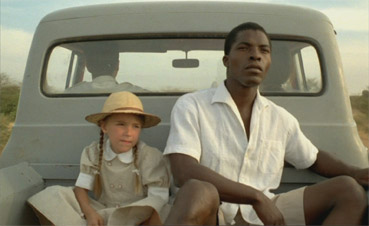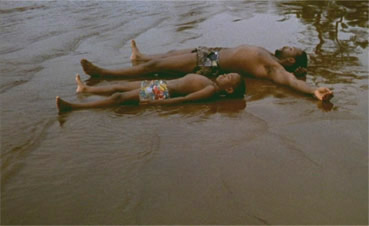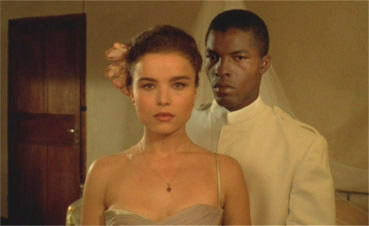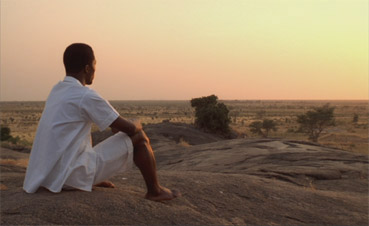"I think you'd like to be in my place, next to Protée. I'll make some room." |
Luc Sigalen. |
Upon seeing Claire Denis' loosely autobiographical 1988 debut film Chocolat for the first time five years ago, I was struck by something during its first two minutes: 'When will something happen?' I wondered, as the camera remained steady on a man and boy in the sea for what seemed like an eternity, before it slowly panned to the right – with a kind of balletic grace – revealing a woman, watching what I had been moments before. I had become so used to flashy, fast editing and invasive pop music soundtracks, that I had lost the ability to appreciate the beauty of a long take, and the natural sounds of the world. Denis' film felt stark and almost minimalist, and yet, there was an innate warmth which seemed to resonate from these early frames – a glow which would only intensify as the film continued. This was my first realisation amongst many that Claire Denis' world was very different from my own, and what I was about to see would stand out in its uniqueness.

On the surface, the premise of Chocolat is a simple one. We follow a woman, France (Mireille Perrier) as she travels through the now independent roads of Northern Cameroon. Leafing through her father's notebook, she reflects upon her childhood on a colonial outpost some thirty years earlier, where her father Marc Dalens (François Cluzet) worked as an administrator for the French government. Frequently away on business, Dalens leaves the running of the household to native servants, while the needs of young France (Cécile Ducasse) and her mother Aimée (Giulia Boschi), are met by trusted houseboy Protée (Isaach De Bankolé).
The mere naming of Denis' central character, France, seems to suggest this is a film whose imagery will be painted with broad strokes. Even when read as a fitting act of patriotism on the part of the Dalens' allowing them to have a little of their country with them wherever they go, the symbolism feels heavy. However, to simply suggest this is a film which solely explores the social and moral intricacies of the relationship between coloniser and the colonised is to reduce the inherent depth and subtlety Denis weaves into the main narrative structure.
There is much more here than meets the eye. While Chocolat does explore large themes: memory; voyeurism; the balance of power between master and slave; and sexual desire, it is the way in which Denis approaches these concepts which makes the film such an engaging mix of visual and emotional potency. The impact of the former undoubtedly heightens that of the latter, working in tandem to great effect. It is no coincidence that some of the film's most visually striking moments are also times where the emotions of the characters run at their highest level. It is easy to imagine the story taking the form of a silent film. Much of its power comes from looks and gestures rather that what is said aloud. In many ways, what is unsaid between these characters is as important as what is, sometimes more so.
Denis' cinema is one where the image takes precedence over that of dialogue. Words are spoken sparingly, are often questions, commands or demands which makes the rare moments where thoughts and feelings are expressed all the more powerful.
The film's most memorable sequences come from another from of dialogue, which explores the sensory interaction between the characters and the world around them; captured in striking tableaux-esque style: the man and boy adult France observes as they lie on the beach, sea water flowing over their bodies; Aimée, enduring the sweltering heat in an elegant evening dress; France as a child watching insects crawl over the crisp table linen.

Constructed to reflect memory, the narrative dips in and out of events with no real indicator of the passage of time, reflecting the slow almost seductive approach to pacing. Such decisions give the film dream-like feel, almost as if the whole story has been conjured from a mirage, brought on by the Cameroonian heat, one that is emphasized through the sparing use of Abdullah Ibrahim's score – an appropriate infusion of traditional African and jazz melodies. This often otherworldly feel is juxtaposed by the look of the film, reflected in the earthy, rooted cinematography of Robert Alazraki, which showcases the country's vast, rocky, dusty open spaces on a palette of browns and green, starkly contrasted with the cloudless blue skies and the whites, creams and beiges of colonial dress.
Elsewhere, there is play with light and shade, textures, skin tones and the differences between them, providing their own silent commentary on issues of identity and race. Characters are often caught in the act of looking, whether at landscapes, animals, or most importantly of all, in this world of unsaid and unseen – other people. It is here where the complexities of Chocolat come into view. Colonialism is indeed explored, but on a tiny, human scale, akin to the neat white stones that mark out the paths bordering the Dalens' outpost, cutting off their access to the rest of Cameroon, whilst leaving them, tempting and unexplored in their line of sight.
The embodiment of this curiosity is of course, Protée. Just as his name suggests, he is many things to many people. For Marc, he is the trusted, loyal servant and some time companion. The young France views him as a father figure, a caregiver and a teacher, exposing her to language and customs, helping her to integrate more into the land she feels so alienated from. Most interestingly of all, for Aimée, he becomes an object of desire. The power balance is such that even as a male, Protée's servant role means he is always dutiful and submissive, there whenever Aimée asks for whatever she may ask of him.
When the sexual tension between the two escalates is where the film employs its masterstroke. The frustration for the pair has become almost too hard to bear, and Prote's frustration is palpable, with anger growing to resentment as the pair attempt to suppress their feelings for one another. His refusal of Aimée is his one act of defiance, even if it is to his own detriment. Whether Aimée desires Protée genuinely, or she simply desires him because she cannot realistically have him – forever in touch and forever out of reach – is just one of many lingering questions Chocolat leaves us to consider.

Emotionally charged material such as this sometimes has the tendency to veer off into melodramatic territory, but much of the film's potency stems from the restrained performances of Boschi and De Bankolé. While giving into their desires would certainly give a dramatic and satisfying payoff in terms of romance, it is to Denis' credit that this territory remains uncharted. The structure of the film hinges on a delicate balance, and such actions would leave a lasting impression on the childhood memories of France. It can be argued, of course, that the culmination of events mean that she is left with memories of Protée that are tinged with sadness, literally and figuratively burned by the experience, but her image of him is not tarnished, as it would be if he were to bring about the breakdown of her parents marriage. The taste left behind would most certainly be a bitter one.
Always positioned as an observer, often silent as she watched, listened and learned on the periphery, peeking behind doors, clinging onto posts, France is never able to fully engage with the world around her. She is both an insider to the culture and simultaneously an outsider, feels affection for where she grew up, but remains confused and isolated from it: she masks the sound of the sea with headphones, brushes the sand from her feet, and takes a bus rather than a taxi in an attempt to feel more authentic. Her attempts to connect as both child and adult are thwarted in varying degrees.
Perhaps it is this strange relationship that makes France's journey so enthralling, and Denis' work so impressive – we can engage in France's world in a way she cannot. Her constant search for something it feels like she can quite never find, as elusive as the horizon line itself. Chocolat is a film which will consistently draw in the viewer, rewarding us each time with new images, questions to consider. Debut status notwithstanding, its achievements cannot be understated. Its richness and complexity have certainly not diminished.
Another of Artificial Eye's licenses from mk2 in Frrance, the anamorphic 1.66:1 transfer is again a strong one, with a good level of detail and contrast that produces rock solid black levels at night but makes few sacrifices to shadow detail, no mean feat when you are dealing with sometimes high contrast lighting, light coloured clothing and dark-skinned faces. There'as a warm, almost golden hue to the colour scheme, particularly to lamplit night scenes, that always feels accurate to the original intention. There are some minor digital artefacts on clear blue skies and grain is occasionally visible, but neither are a problem and you'll need a big TV to really spot tham.

The Dolby 2.0 mono soundtrack is clear and free of hiss and distortion, all you can ask of a film that tells its story quietly.
Given the importance of the film within the body of Denis' work and its critical success, the disc's extras are disappointingly light. The only true extra is the film's original trailer (1:32). Presented in its original quality, the transfer is somewhat grainy and lacking in clarity, but it effectively demonstrates the major themes and mood of the film though some clever superimposed editing of the characters and Cameroonian landscape. In addition, two trailers are included for other Artificial Eye DVDs, Abbas Kiarostami's The Wind Will Carry Us, and the forthcoming release of Lodge Kerrigan's Claire Dolan.
Given the prominence of colonialism in film, it is hard to find a fresh and interesting angle without becoming too reliant on stereotyped characterisation and picture postcard aesthetics. While Denis' film is undeniably a beautiful one, her perspective and detailed approach means the film has much more to say about identity, power and desire than may first appear. Chocolat remains an incredibly powerful and emotionally resonant film, which is more than deserving of second and even third looks. As Denis' debut feature, it sets up many of the themes and ideas she would come to explore in her later work; showcasing the first utterances of a strong and unique voice in contemporary filmmaking – a voice whose tone has not quietened with the passage of time.
|